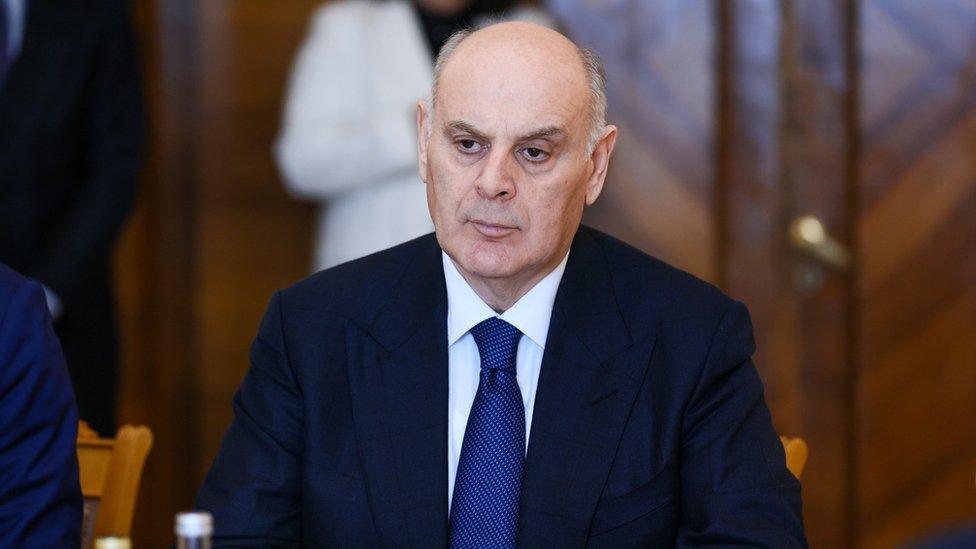
The leader of Georgia’s breakaway region of Abkhazia, Aslan Bzhania, has resigned following days of mass protests over a controversial bill that would have deepened ties between the region and Russia. Bzhania announced his decision in a statement late Monday, explaining that his resignation was aimed at maintaining “stability and constitutional order” in the region. The protests, which included demonstrators storming the parliament in the regional capital of Sukhumi, were sparked by a proposed bill that would have legalized Russian investment and land ownership in Abkhazia.
In his statement, Bzhania’s press office confirmed that the bill had been withdrawn, but also indicated that the protests had escalated to a point where the situation had become untenable. To ensure peace and order, Bzhania’s office said that an agreement had been reached with the protesters to vacate the parliament building by Tuesday. The region’s parliament is expected to formally consider Bzhania’s resignation later that day.
As per the resignation plan, Bzhania’s deputy will assume the role of acting leader, with the authority to dismiss the current prime minister. However, the press office also issued a warning: Bzhania would retract his resignation if the protesters refused to leave the parliament building, indicating the tense standoff was not yet over.
Bzhania has long described himself as the president of Abkhazia, but his authority is not recognized by Georgia or most of the international community. While Russia recognized Abkhazia’s independence following the 2008 war between Georgia and Russia, the international community, including the United Nations, considers Abkhazia to be part of Georgian territory, which it views as “occupied” by Russia. Despite this, Abkhazia has operated with de facto independence and has been heavily reliant on Russian support both economically and politically.
The protests in Abkhazia were triggered by a bill that sought to formalize Russian land ownership and investment in the region, raising alarm among locals who feared that it would lead to increased Russian influence in their daily lives. There were concerns that the bill would drive up property prices and make it even harder for Abkhaz citizens to afford land in their own region. The protests reflected a deep unease about Abkhazia’s growing dependence on Russia and the potential long-term consequences of closer ties between the two.
Abkhazia has long been a region of strategic interest for Russia. The area, located along the Black Sea and bordered by the Caucasus mountains, has been a key location for Russian tourism and military presence. Abkhazia’s scenic coastline made it a popular vacation destination for the Soviet elite before the collapse of the USSR in 1991, and it remains a favorite spot for Russian tourists. However, the region’s economy is heavily reliant on Russia, both in terms of trade and tourism, making it highly susceptible to Moscow’s influence.
The 1992-93 war between Georgia and Abkhazia, backed by Russian military forces, resulted in Abkhazia’s de facto secession from Georgia. Abkhazia declared independence shortly thereafter, but only Russia, along with a handful of other countries, has recognized it as an independent state. In 2009, Russia signed an agreement with Abkhazia to take control of its borders with Georgia, further solidifying Moscow’s influence over the region. In 2014, a “strategic partnership” agreement was signed between Russia and Abkhazia, deepening their military, political, and economic ties.
The proposed legislation had ignited widespread fears that it would further tighten Russia’s grip on the region. Locals worried that the influx of Russian investment and land purchases could price them out of their own property market, reinforcing concerns about the loss of Abkhazia’s independence and its eventual absorption into Russia. This fear was reflected in the protests, which sought to prevent what many saw as a significant step toward Abkhazia becoming even more entrenched within Russia’s sphere of influence.
While Bzhania’s resignation may offer some temporary relief, the underlying tensions remain. The future of Abkhazia’s relationship with Russia, and its ability to balance economic dependence with maintaining a degree of autonomy, will continue to shape the region’s political landscape. The protests serve as a reminder of the deep divisions within Abkhazia over its continued alignment with Russia, and it remains to be seen whether the political leadership can stabilize the situation in the long term. The withdrawal of the pro-Russia bill may have quelled the immediate unrest, but the broader concerns about Abkhazia’s future continue to loom large.








